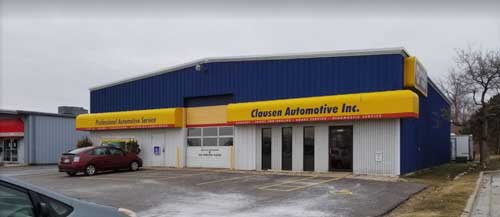Radiator Repair & Replacement | Madison, WI
How do I Know If My Radiator is Bad?
Did you know that a failure in your vehicle’s cooling system is the primary cause of an engine breakdown? If the engine of your car or light truck is overheating or showing any other signs listed below that a radiator repair will be required, stop in and talk to our professionals at Clausen Automotive. It is highly likely that your car or truck needs repair to its cooling system.
Get a Quote Radiator Repair Check-Up Now
Watch out for these 6 Warning Signs of a Bad Radiator in your Car:
- Engine belts and hoses show signs of wear and tear, such as cracking.
- The dashboard temperature gauge indicates that the vehicle is running hot.
- The engine smells “hot”.
- Dark, non-transparent fluid is leaking from the engine area.
- Steam is coming from under the hood.
- The ratio of anti-freeze to water is too low (know the manufacturer’s recommended level).
Ask our Radiator Specialist to know the Radiator Repair Checklist for your Vehicle!
Our radiator specialists at Clausen Automotive provide a complete radiator flush and repair service checklist that includes the following:
- The radiator is tested for pressure and leaks
- Flush chemicals are added to the radiator
- Radiator flush machine is used to power flush the entire system
- Radiator refilled with the correct amount of antifreeze
- Lubricant is added to the radiator system as required
- Engine components (including radiator cap & hoses) are inspected
Our ASE-certified master technicians will perform a professional multi-point inspection of your engine and can provide you with a complete analysis, together with an estimated cost for a radiator repair or replacement. Call us today for an appointment!
Why Choose Clausen Automotive for Radiator Repair?
- Trusted local auto repair shop in Madison, WI
- Skilled, experienced technicians
- Advanced diagnostic equipment
- High-quality cooling system components
- Honest recommendations and clear communication
- Friendly, customer-focused service
We’re proud to be a reliable choice for radiator and cooling system repair in Madison.
Serving Madison & Nearby Communities
We proudly serve drivers from:
- Madison, WI
- Fitchburg, WI
- Middleton, WI
- Monona, WI
- Verona, WI
- Waunakee, WI
If you’re looking for cooling system repair near Madison, Clausen Automotive is conveniently located and ready to help.
Frequently Asked Questions
What causes a radiator to go bad?
A radiator can go bad due to corrosion, rust buildup, coolant leaks, or clogged passages. Overheating, poor maintenance, and using old or contaminated coolant can also damage the radiator over time, leading to engine cooling issues. Read More
How do you know when to replace the radiator?
You may need to replace your radiator if you notice frequent overheating, coolant leaks, rust or sludge buildup, or a drop in coolant levels. Early replacement prevents engine damage. Read More
How often do car radiators need to be replaced?
Car radiators typically last 8 to 10 years or about 100,000 miles. Regular coolant flushes and inspections help extend their lifespan and prevent overheating problems. Read More
How often should you replace your radiator?
You should replace your radiator every 8 to 10 years, or sooner if you notice leaks, rust, or frequent overheating. Regular maintenance helps catch problems before they lead to engine damage. Read More
How Do You Know If Your Car Radiator is Bad?
Signs of a bad radiator include engine overheating, visible coolant leaks, rust or sludge buildup, and low coolant levels. Addressing these early can help prevent major engine issues. Read More
Schedule Your Radiator Service in Madison, WI
Slow leaks or overheating can damage your engine. Let our expert techs repair or replace your radiator with precision.
Expert radiator service, quick turnaround & dependable repairs — keep your cooling system working at its best.
How do I Know If My Radiator is Bad?
Did you know that a failure in your vehicle’s cooling system is the primary cause of an engine breakdown? If the engine of your car or light truck is overheating or showing any other signs listed below that a radiator repair will be required, stop in and talk to our professionals at Clausen Automotive. It is highly likely that your car or truck needs repair to its cooling system.
Get a Quote Radiator Repair Check-Up Now
Watch out for these 6 Warning Signs of a Bad Radiator in your Car:
- Engine belts and hoses show signs of wear and tear, such as cracking.
- The dashboard temperature gauge indicates that the vehicle is running hot.
- The engine smells “hot”.
- Dark, non-transparent fluid is leaking from the engine area.
- Steam is coming from under the hood.
- The ratio of anti-freeze to water is too low (know the manufacturer’s recommended level).
Ask our Radiator Specialist to know the Radiator Repair Checklist for your Vehicle!
Our radiator specialists at Clausen Automotive provide a complete radiator flush and repair service checklist that includes the following:
- The radiator is tested for pressure and leaks
- Flush chemicals are added to the radiator
- Radiator flush machine is used to power flush the entire system
- Radiator refilled with the correct amount of antifreeze
- Lubricant is added to the radiator system as required
- Engine components (including radiator cap & hoses) are inspected
Our ASE-certified master technicians will perform a professional multi-point inspection of your engine and can provide you with a complete analysis, together with an estimated cost for a radiator repair or replacement. Call us today for an appointment!
Why Choose Clausen Automotive for Radiator Repair?
- Trusted local auto repair shop in Madison, WI
- Skilled, experienced technicians
- Advanced diagnostic equipment
- High-quality cooling system components
- Honest recommendations and clear communication
- Friendly, customer-focused service
We’re proud to be a reliable choice for radiator and cooling system repair in Madison.
Serving Madison & Nearby Communities
We proudly serve drivers from:
- Madison, WI
- Fitchburg, WI
- Middleton, WI
- Monona, WI
- Verona, WI
- Waunakee, WI
If you’re looking for cooling system repair near Madison, Clausen Automotive is conveniently located and ready to help.
Frequently Asked Questions
What causes a radiator to go bad?
A radiator can go bad due to corrosion, rust buildup, coolant leaks, or clogged passages. Overheating, poor maintenance, and using old or contaminated coolant can also damage the radiator over time, leading to engine cooling issues. Read More
How do you know when to replace the radiator?
You may need to replace your radiator if you notice frequent overheating, coolant leaks, rust or sludge buildup, or a drop in coolant levels. Early replacement prevents engine damage. Read More
How often do car radiators need to be replaced?
Car radiators typically last 8 to 10 years or about 100,000 miles. Regular coolant flushes and inspections help extend their lifespan and prevent overheating problems. Read More
How often should you replace your radiator?
You should replace your radiator every 8 to 10 years, or sooner if you notice leaks, rust, or frequent overheating. Regular maintenance helps catch problems before they lead to engine damage. Read More
How Do You Know If Your Car Radiator is Bad?
Signs of a bad radiator include engine overheating, visible coolant leaks, rust or sludge buildup, and low coolant levels. Addressing these early can help prevent major engine issues. Read More
Schedule Your Radiator Service in Madison, WI
Slow leaks or overheating can damage your engine. Let our expert techs repair or replace your radiator with precision.
Expert radiator service, quick turnaround & dependable repairs — keep your cooling system working at its best.


